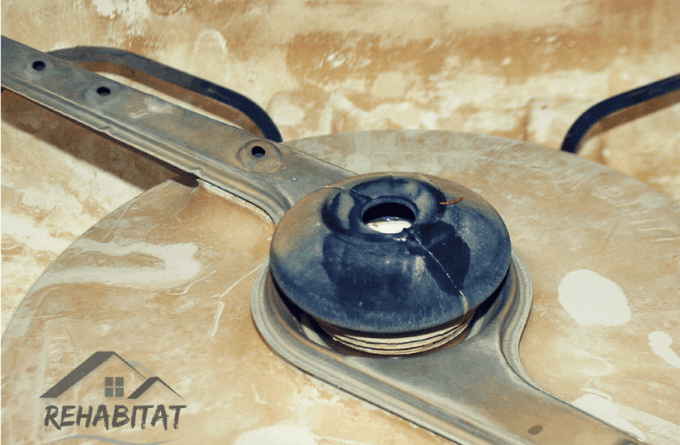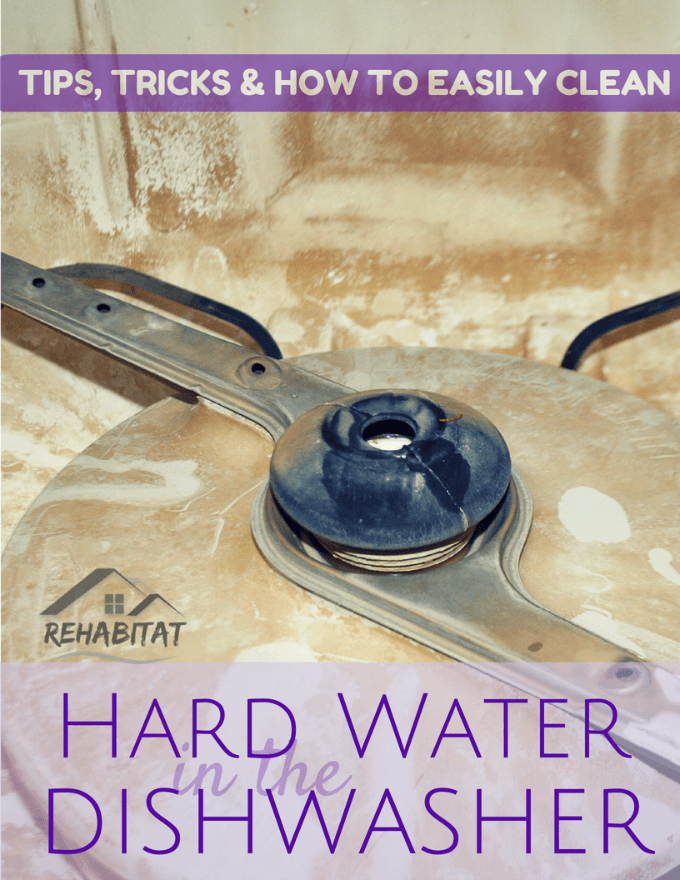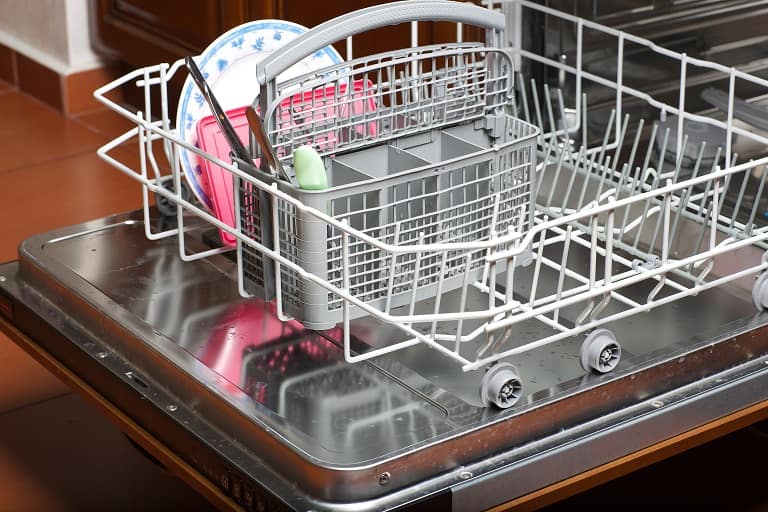
If you’ve ever wondered how to say goodbye to those pesky hard water stains in your dishwasher, fret no more. We’ve got you covered with effective and simple techniques to remove those stubborn marks that just won’t budge. No need to stress over the sight of unsightly stains on your sparkling dishes and glassware – read on for some friendly and easy-to-follow solutions that will leave you with a dishwasher that looks as good as new.

1. Understanding Hard Water Stains
1.1 What are Hard Water Stains?
Hard water stains are mineral deposits that accumulate on various surfaces due to the presence of high levels of minerals, such as calcium and magnesium, in the water supply. When water evaporates, these minerals are left behind, leaving behind unsightly stains that can be difficult to remove.
1.2 Causes of Hard Water Stains
Hard water stains are primarily caused by the presence of minerals in the water supply. These minerals can come from a variety of sources, including groundwater and municipal water systems. Factors such as the geological composition of the area, the type of plumbing system, and the water treatment process can all contribute to the hardness of the water.
1.3 Effects of Hard Water Stains
Hard water stains can have several negative effects. First and foremost, they can be unsightly and make your dishwasher look dirty and poorly maintained. Additionally, hard water stains can affect the performance of your dishwasher. They can clog water supply lines, reduce water flow, and inhibit the effectiveness of detergents and rinse aids. Over time, these stains can also cause corrosion and damage to the internal components of your dishwasher.
2. Identifying Hard Water Stains in Dishwasher
2.1 Signs of Hard Water Stains
Identifying hard water stains in your dishwasher is relatively easy. Look for white or cloudy residue on the interior walls, racks, and utensil holders of your dishwasher. These stains are typically more noticeable after the water has evaporated. Another indication of hard water stains is the presence of spots or streaks on glassware and dishes, even after running them through the dishwasher.
2.2 Common Areas Affected by Hard Water Stains
Hard water stains can appear in various areas of your dishwasher. The interior walls, door, bottom, and the heating element are common areas where stains can accumulate. Additionally, the racks, spray arms, and utensil holders can also be affected, which can hinder the proper functioning of your dishwasher.
2.3 Types of Hard Water Stains in Dishwasher
There are two main types of hard water stains that can occur in your dishwasher: limescale and mineral deposits. Limescale is a chalky white substance that forms on surfaces when hard water evaporates. Mineral deposits, on the other hand, can appear as white, green, or brown stains on various components of your dishwasher, such as the spray arms and racks.

3. Preparing Your Dishwasher for Cleaning
3.1 Safety Precautions
Before cleaning your dishwasher, it’s essential to take some safety precautions. First and foremost, ensure that the dishwasher is unplugged or switched off to avoid the risk of electric shock. Additionally, make sure to wear gloves to protect your hands from any chemicals or hot water that you may be using during the cleaning process.
3.2 Tools and Materials Needed
To effectively clean hard water stains from your dishwasher, you will need a few tools and materials. Gather items such as vinegar, baking soda, lemon juice, salt, a soft cloth or sponge, a toothbrush, and a cup or bowl.
3.3 Clearing the Dishwasher
Before proceeding with the cleaning process, it is essential to clear out any dishes, utensils, or debris from your dishwasher. Remove any removable components, such as racks and utensil holders, to ensure that you can clean every nook and cranny thoroughly.
4. Natural Methods to Remove Hard Water Stains
4.1 Vinegar and Baking Soda
One effective and natural method to remove hard water stains is by using vinegar and baking soda. Start by placing a cup of white vinegar in a dishwasher-safe container on the top rack of your dishwasher. Then, sprinkle a generous amount of baking soda on the bottom of the dishwasher. Run a regular cycle with hot water to allow the vinegar and baking soda to break down and remove the stains.
4.2 Lemon Juice
Another natural remedy for hard water stains is lemon juice. Squeeze fresh lemon juice and apply it directly to the affected areas, such as the walls, racks, and utensil holders. Let the lemon juice sit for a few minutes to allow the acid to dissolve the stains. Use a soft cloth or toothbrush to scrub away the residue, and then rinse thoroughly with water.
4.3 Salt and Vinegar Solution
A salt and vinegar solution can also be used to tackle stubborn hard water stains. Combine equal parts of salt and vinegar to create a paste-like consistency. Apply the mixture to the stains and let it sit for about fifteen minutes. Use a soft cloth or sponge to gently scrub the stained areas, and then rinse with water.

5. Commercial Cleaners for Hard Water Stains
5.1 Dishwasher-Safe Cleaners
If natural methods do not effectively remove the hard water stains, you may consider using dishwasher-safe cleaners specifically formulated for removing hard water stains. These cleaners are designed to be safe for your dishwasher’s components while effectively breaking down and eliminating the stains. Follow the instructions provided by the manufacturer for the best results.
5.2 Limescale Removers
Limescale removers are another option for tackling hard water stains in your dishwasher. These commercial cleaners are specifically formulated to dissolve and remove limescale deposits, which are a common type of hard water stain. Follow the instructions on the product packaging and ensure that the cleaner is safe for use in your dishwasher.
5.3 Enzyme-Based Cleaners
Enzyme-based cleaners are effective in breaking down mineral deposits and stains caused by hard water. These cleaners contain enzymes that specifically target and dissolve the minerals, leaving your dishwasher clean and free from stains. Look for enzyme-based cleaners that are safe for use in dishwashers and follow the instructions provided.
6. Deep Cleaning Techniques
6.1 Disassembling Dishwasher Components
To achieve a thorough clean, it may be necessary to disassemble certain components of your dishwasher. Remove the racks, utensil holders, and spray arms to access hard-to-reach areas where stains may have accumulated. Follow the manufacturer’s instructions to ensure that you can safely disassemble and reassemble these components.
6.2 Cleaning Filters, Sprayer Arms, and Racks
Once you’ve disassembled the components, take the opportunity to clean the filters, sprayer arms, and racks individually. Rinse them with warm water to remove any loose debris, and then apply a cleaning solution, such as vinegar or a dishwasher-safe cleaner, to remove any hard water stains or mineral buildup. Use a toothbrush or soft cloth to scrub away the stains, and rinse thoroughly before reassembling.
6.3 Descaling the Dishwasher
Descaling your dishwasher is an essential step in deep cleaning to remove mineral buildup effectively. Use a commercial descaling agent designed for dishwashers and follow the instructions provided. This process will help eliminate any stubborn hard water stains and ensure that your dishwasher’s internal components are working efficiently.
6.4 Removing Mineral Buildup
In addition to hard water stains, mineral buildup can occur in your dishwasher and affect its performance. To remove mineral buildup, fill a dishwasher-safe container with a mixture of equal parts vinegar and water. Place the container on the bottom rack of the dishwasher and run a hot water cycle. The vinegar will break down the mineral deposits, leaving your dishwasher clean and free from buildup.

7. Preventing Hard Water Stains
7.1 Rinse Aid Usage
Using a rinse aid in your dishwasher can help prevent hard water stains from forming. Rinse aids work by reducing the surface tension of water, allowing it to flow freely and preventing minerals from clinging to surfaces. Be sure to choose a rinse aid specifically formulated for hard water and follow the manufacturer’s instructions for optimal results.
7.2 Water Softeners
Installing a water softener can be an effective long-term solution for preventing hard water stains. Water softeners remove the minerals responsible for hardness, ensuring that the water flowing into your dishwasher is free from these deposits. Consult a professional to determine the best water softener system for your home and have it properly installed.
7.3 Regular Maintenance
Regular maintenance of your dishwasher can also help prevent hard water stains. Clean the dishwasher filters frequently to ensure optimal water flow. Regularly check and clean the spray arms, racks, and utensil holders. Additionally, inspect the dishwasher’s interior for any signs of mineral buildup and promptly address them to prevent stains from forming.
8. Troubleshooting Persistent Stains
8.1 Plumbing Issues
If you are experiencing persistent hard water stains, consider having your plumbing system inspected. Plumbing issues, such as mineral buildup in pipes or low water pressure, can contribute to the presence of hard water stains in your dishwasher. Consult a professional plumber to identify and address any underlying plumbing problems.
8.2 Ion Exchange Resin
Another option for dealing with persistent hard water stains is the use of an ion exchange resin system. This system replaces calcium and magnesium ions with sodium ions, effectively softening the water and preventing the formation of hard water stains. However, installing an ion exchange resin system can be costly, so consider this option if other solutions have been unsuccessful.
8.3 Professional Help
If all else fails, it may be time to seek professional help. Contact a dishwasher repair specialist or a professional cleaning service that specializes in removing hard water stains. They have the expertise, equipment, and experience to thoroughly clean your dishwasher and address any persistent stains that you have been unable to remove.

9. Dos and Don’ts for Removing Hard Water Stains
9.1 Dos
- Do use natural remedies such as vinegar, lemon juice, and baking soda to remove hard water stains.
- Do disassemble dishwasher components for a deeper clean.
- Do use dishwasher-safe cleaners and limescale removers recommended for removing hard water stains.
- Do consider installing a water softener to prevent hard water stains in the future.
- Do practice regular maintenance to keep your dishwasher clean and prevent the accumulation of hard water stains.
9.2 Don’ts
- Don’t use abrasive materials or cleaners that can damage your dishwasher’s interior.
- Don’t overlook safety precautions such as unplugging the dishwasher and wearing gloves during the cleaning process.
- Don’t ignore persistent hard water stains. Address them promptly to prevent further damage to your dishwasher.
- Don’t forget to consult a professional if you are unable to remove stubborn hard water stains on your own.
- Don’t skip regular maintenance and cleaning, as it is crucial for the overall performance and lifespan of your dishwasher.
10. Conclusion
Hard water stains can be an unsightly and frustrating problem in your dishwasher. However, with the right knowledge and techniques, you can effectively remove and prevent these stains, keeping your dishwasher clean and in optimal condition. Whether you opt for natural remedies, commercial cleaners, or professional help, taking the time to address hard water stains will not only improve the appearance of your dishwasher but also prolong its lifespan and ensure its continued performance. Remember to practice regular maintenance, use preventative measures, and follow the dos and don’ts outlined in this article to keep your dishwasher free from stubborn hard water stains.


